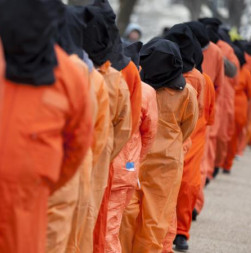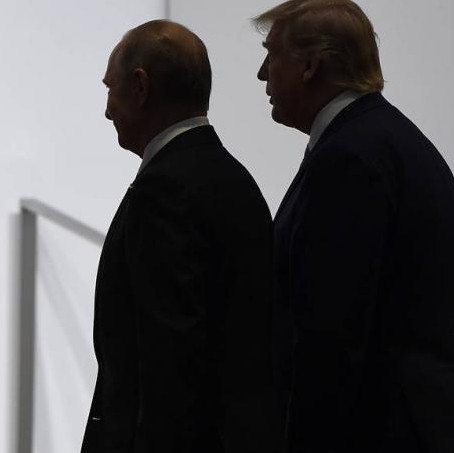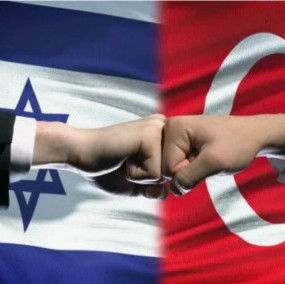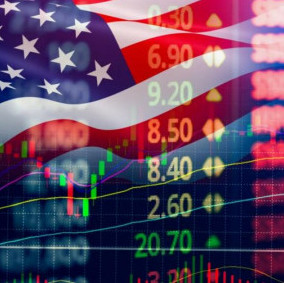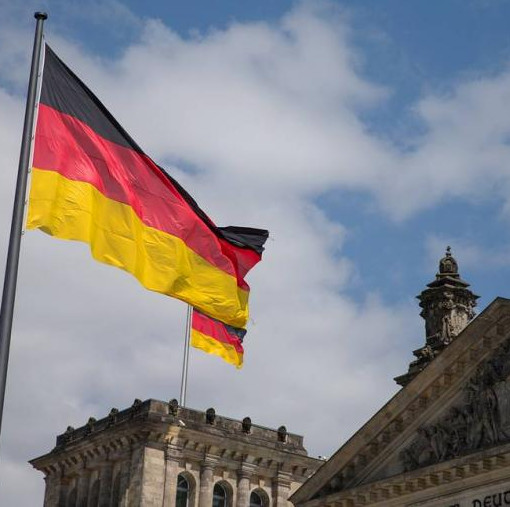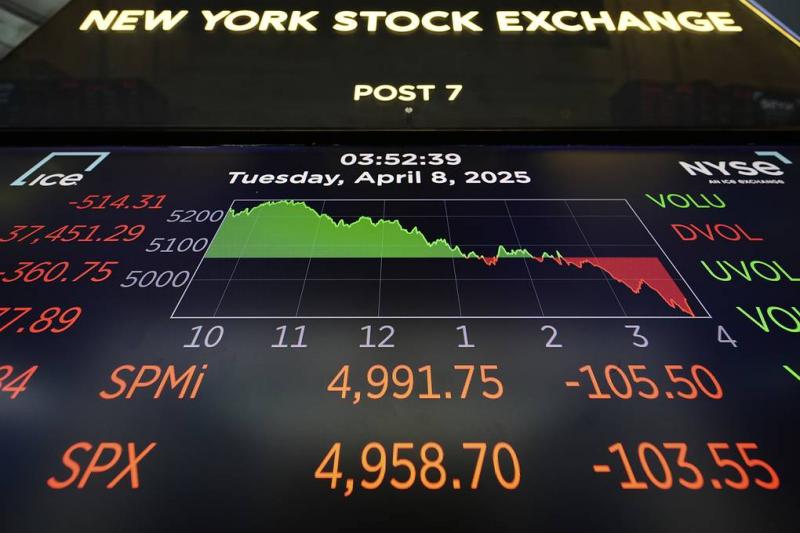
- Press review: Russia, US move past Biden’s legacy as Kiev assures NATO of fight readiness
- Press review: US and China launch trade war while Russia and the US hold new talks
- Press review: Iran, Russia, China plan talks as US and China intensify trade conflict
- Press review: US sees first protests since Trump’s return and OSCE seeks Russia’s comeback
Donald Trump’s trade escalation may lead to a global recession; Europe actively seeks to advance the idea of a future ‘war with Russia;’ and the US, Iran are expected to hold talks on the nuclear issue. These stories have topped Wednesday’s newspaper headlines across Russia, according to TASS News Agency.
Media: Trump’s trade war may lead to global recession
An all-out trade war across the world will lead to a global recession, said experts interviewed by Izvestia. New and increased US tariffs on a number of countries are taking effect on April 9. As for China, tariffs were raised to 104% after the country took reciprocal measures. Meanwhile, over 70 nations have called on the White House to reconsider the tariffs. Markets reacted positively and stopped declining. However, they won’t be able to rebound quickly.
The tariffs will primarily hit the United States itself as they are highly likely to lead to a spike in inflation and a subsequent recession in the US, Freedom Finance Global analyst Georgy Timoshin predicts. Trade between countries will decrease because of the tariffs, which will push the majority of countries further into recession, Tatyana Skryl, associate professor with the Department of Economic Theory at the Plekhanov Russian University of Economics, agrees.
China could be second after the US in terms of the damage caused by trade wars. Its economic growth may slow down to 2% compared to the 4-5% recorded in recent years, said Kirill Seleznyov, stock market expert at Garda Capital. "However, China has more options to adapt to the changes. It can offset some of the losses by manipulating the yuan exchange rate and mitigating the effect of trade restrictions, Dmitry Kuznetsov, a researcher with the International Trade Research Laboratory at the Presidential Academy’s Institute of Applied Economics, pointed out.
The European Union’s retaliatory tariffs are likely to slow down the EU’s economic growth, Pavel Sevostyanov, associate professor at the Plekhanov Russian University of Economics, told Vedomosti. Meanwhile, the US could lose about $100 billion in tariff proceeds in ten years, which would result in a decline in economic activity and, probably, job cuts in the affected sectors, the expert specified. Other consequences potentially include an increase in unemployment in the industries affected by the tariffs and the declining competitiveness of European and US companies on the global market, which could lead to a shift in trade flows and a rise in trade tensions between the EU and the US, Sevostyanov added. The analyst does not expect a full-scale crisis or recession in either the US or the EU but sees an economic slowdown as inevitable.
Izvestia: Europe actively seeks to promote idea of future ‘war with Russia’
Europe’s leading politicians, including top EU officials, as well as mainstream media outlets, continue to provide the public with the details of a "future war with Russia," urging their fellow citizens to prepare for it. This is how a specific information context is being recreated in Europe, which has not been there for over half a century, Izvestia notes.
Experts believe that the hyping up of the "Russia threat" looks like a tool European political elites use in an attempt to unify society amid absolute uncertainty. Russia depicted as an existential enemy is a universal excuse for the mobilization of resources and society. Clearly, few in European capitals believe that the threat of a nuclear war with Moscow is real. The actual fight for Europe’s future geopolitical and economic role is against the United States, which until recently was the EU’s partner against Russia.
Attempts are underway to exaggerate the military threat, while the money thrown into the defense industry vanishes without a trace, Vladislav Belov, deputy director of the Russian Academy of Sciences’ Institute of Europe, noted. He points to the impact that political statements have on investor behavior. Defense corporations are always interested in larger government spending, Belov added.
Besides, according to Pavel Timofeev, director of the Sector of Regional Problems and Conflicts at the Institute of World Economy and International Relations, this is also a way to achieve political goals. "I believe that this narrative is being used in order to control the people, rein in the opposition and reiterate the need to rally around the leader and the idea of ‘European unity.’ Political and economic uncertainty persists on the continent. Under Trump, the Europeans cannot count on US military and political guarantees. Their policy for the time being is to rely on their own resources and strengthen the EU’s defense capacity, increasing defense spending and so on. This should be seen as a short-term measure aimed at quickly and cheaply demonstrating that Europe is not afraid of threats. However, it’s hardly about preparations for a real war," the expert concluded.
Media: US, Iran to hold discussions on nuclear issue
The United States and Iran agreed to hold discussions on the resumption of the nuclear deal in Oman on April 12. Moscow has welcomed the willingness of Washington and Tehran to build dialogue, Vedomosti reports.
The parties are not ready yet to launch direct talks because of the long period of no dialogue, Director of the Center for the Study of Contemporary Iran Radzhab Safarov said. Before engaging in a direct conversation, both Washington and Tehran should create conditions for building trust, which is hard to do at the initial stage without intermediaries. US and Iranian representatives are unlikely to reach an agreement in the near future, Safarov went on to say. "It may take a long time before relations between the two countries move from antagonistic to normal. In any case, readiness for talks is already a positive result," he pointed out.
In case of danger, Iran may target US installations in the Middle East, Yury Lyamin, an expert with the Center for Analysis of Strategies and Technologies, noted. Besides, in the expert’s view, the Iranians could close the Persian Gulf for all Western ships. Finally, Tehran could withdraw from the Nuclear Non-Proliferation Treaty. Still, Lyamin doubts that a serious military confrontation will break out between Iran and the US. First, the Americans don’t have enough forces in the Middle East to engage in a major conflict. Second, an armed conflict with the US would have catastrophic consequences for Iran and the entire region.
Pavel Koshkin, senior researcher at the Russian Academy of Sciences’ Institute for US and Canadian Studies, explained to Nezavisimaya Gazeta, that the likelihood of talks between the US and Iran was partially based on US President Donald Trump’s desire to divert attention from the market collapse triggered by his new tariff policy. "Trade wars have caused too big a stir in the global economy," the expert remarked. "In addition, it’s important for the US president to demonstrate at least some accomplishments and success amid a looming split in the Republican camp over his tariff policy. Moreover, his ratings are showing a declining trend. No major breakthroughs have been achieved in talks on Ukraine, either. That said, a range of reasons needs to be taken into consideration here," the analyst stressed.
Nezavisimaya Gazeta: Rising gold prices help Russia partially mitigate freezing of assets
Central banks across the world are increasing their gold reserves. Russia has long ranked among the world’s top five for the amount of physical gold in its reserves. The policy of Russia’s Central Bank, which started to buy gold ten years ago, has now helped the country counterbalance at least one-third of its assets frozen by the West, Nezavisimaya Gazeta writes.
Investors maintain interest in gold as a safe-haven asset amid a rise in trade tensions, particularly between the United States and China. Analysts expect that uncertainty in global trade and the threat of tariffs will continue to strengthen central banks’ interest in gold.
The share of gold in Russia’s international reserves has been growing for the third consecutive month, the Central Bank said. Western agencies point out that the Russian Central Bank’s pragmatic policy has offset at least one-third of the assets that the West seized after the conflict in Ukraine broke out. Russia started to actively purchase gold in 2014. The accumulation of gold reserves was seen as a way to protect the country from geopolitical shocks, and it has proved effective, Bloomberg Economics analyst Alex Isakov added.
"This is the main advantage of monetary gold: rising global prices make it possible to increase the value of reserves without any effort. As a result, the share of monetary gold in Russia’s reserves is increasing due to a surge in global prices," Vasily Kutyin, director of analytics at Ingosstrakh bank, said.
Freedom Finance Global analyst Vladimir Chernov adds that global central banks began to sharply boost the share of gold in their gold and foreign currency reserves after the currency share of Russia's reserves was frozen in 2022. "With physical gold stored inside the country, these reserves are impossible to freeze or seize. This is how they made sure they won’t find themselves in a similar situation. Geopolitical conflicts, trade wars, and economic crises create increased demand for defensive assets. Gold remains one of the few assets that maintain high liquidity and value in any circumstances," the analyst emphasized.
Rossiyskaya Gazeta: Russia may resume gas transit through Ukraine
The destruction of the Sudzha gas metering station in Russia’s Kursk Region, through which Moscow used to transport gas to Europe via Ukraine until the beginning of 2025, does not mean an end to the idea of resuming gas supplies along this route.
Moreover, logistically, it would be easier to do than to rebuild the Nord Stream pipelines, which also were blown up, or resolve disagreements with Poland in order to reactivate the Yamal-Europe pipeline. However, there is a political aspect: Ukraine has made it clear that it opposes the resumption of supplies. Still, Kiev may change its mind if it faces pressure from Europe or the US, Rossiyskaya Gazeta writes.
According to Alexey Grivach, deputy head of the National Energy Security Fund, the gas pipeline could be repaired quite quickly. It’s another thing that for Russia, this route cannot be a priority in terms of increasing gas supplies to Europe in case relations with the EU are revived in the energy sector. Freedom Finance Global analyst Vladimir Chernov explains that apart from the Sudzha station, there are other gas pipeline entry points for Russian gas reaching Ukraine, not only from Russia but also from Belarus. However, launching any of these routes requires political will.
Energy expert Kirill Rodionov believes that it would be easier and cost-effective to rebuild the Sudzha gas metering station than reconstruct the undersea part of the Nord Stream pipelines or make an agreement with Poland on the Yamal-Europe pipeline. It won't be possible to launch the undamaged thread of Nord Stream 2 as the gas pipeline was not certified back in 2022 because the process had been halted. Even if the ownership of the Nord Stream pipelines changes, additional regulatory approvals will have to be obtained, which may take a considerable time.
The expert adds that politics will also play a role in Ukrainian transit. From the electoral point of view, European leaders will benefit from demonstrating that Ukraine’s dependence on the EU’s financial assistance is decreasing. They would seek to make their people see that Ukraine is resuming Russian gas transit to Europe to generate its own revenue.
TASS is not responsible for the material quoted in these press reviews

